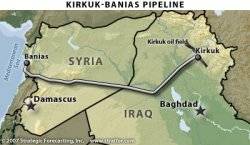The Syrian regime of President Bashar al-Assad has received substantial imports of Iraqi crude oil from an Egyptian port in the last nine months, shipping and payments documents show, part of an under-the-radar trade that has kept his military running despite Western sanctions.
Assad's regime has been blacklisted by Western powers for its role in the two-and-a-half year civil war, forcing Damascus to rely on strategic ally Iran as its main supplier of crude oil.
An exclusive Reuters examination based on previously undisclosed commercial documents about Syrian oil purchases shows however that Iran is no longer acting alone.
Dozens of shipping and payment documents viewed by Reuters show that millions of barrels of crude delivered to Assad's government on Iranian ships have actually come from Iraq, through Lebanese and Egyptian trading companies.
The trade, which is denied by the firms involved, has proven lucrative, the documents appear to show, with companies demanding a steep premium over the normal cost of oil in return for bearing the risk of shipping it to Syria.
It also highlights a previously undisclosed role of Egypt, Iraq and Lebanon in Assad's supply chain, despite those countries' own restrictions on assisting his regime.
There was no evidence that the Iraqi or Egyptian governments were involved in shipping Iraqi oil through Egypt's port, as crude can change hands after first being exported.
Both the Syrian national oil company that received the oil, Sytrol, and the Iranian shipping operator that delivered it, the National Iranian Tanker Co (NITC), are on US and EU sanctions lists.
The cache of documents describing the trade between March and May this year was shown to Reuters by a source on condition of anonymity.
Many details were corroborated by a separate Middle Eastern shipping source with long-standing ties to the Syrian maritime industry.
Publicly available satellite tanker tracking data was used to confirm the movements of ships.
Syria invoiced
The documents refer to at least four shipments by four tankers named Camellia, Daisy, Lantana and Clove, each of which is operated by Iran's NITC and, say the documents, carried Iraqi oil from Egypt's Mediterranean port of Sidi Kerir to Syria.
According to the documents, Beirut-based trading firm Overseas Petroleum Trading (OPT) invoiced Syria for arranging at least two of the shipments and was involved in a third, while a Cairo-based firm, Tri-Ocean Energy, was responsible for loading Iraqi oil into at least one.
An EU country government source said Tri-Ocean is already under scrutiny by the US for suspected violations of sanctions against Iran, giving no further details.
Syria imported up to 17 million barrels of crude oil between February and October, of which roughly half came directly from Iran and half from Egypt's Sidi Kerir port.
The cache of documents reveals that at least half of the oil from Egypt's port was Iraqi crude.
OPT arranged the shipments with Syria's internationally blacklisted state-owned oil company, Sytrol, operator of the one functioning refinery still under Assad's control.
The documents show the firm invoicing Sytrol for almost $250 million for two deliveries of Iraqi crude it had arranged in March and May to Syria's Banias refinery.
Tracking signals switched off
The price for each barrel of Iraq's Basra Light crude in the invoices is between $15 and $17 above the official Iraqi price at that time, equivalent to an extra $15m for each tanker.
Egyptian oil firm Tri-Ocean Energy loaded at least one cargo of Iraqi crude onto an Iranian tanker that was delivered into Syria by OPT at the end of May, according to the documents.
Tri-Ocean's senior trading director Ali Tolba denied in an email that his company supplied Syria with crude or had loaded Iraqi oil onto Iranian tankers.
Some of the documents confirming the arrival of the oil in Syria were stamped or signed by a shipping agency called Med Control Syria. Jhony Matnious, a manager at the company in Damascus, told Reuters by email that the crude imports were Iranian through a government agreement between Damascus and Tehran.
According to Reuters AIS Live ship tracking data, the four ships each sailed north towards Syria.
Each ship switched off its satellite signals just before the delivery date in Syria, then reappeared on satellite tracking shortly after.
PHOTO CAPTION
January 27 2011 photo, Syria eyes pipelines through iraq damascus Syria .
Aljazeera


 Home
Home Discover Islam
Discover Islam Quran Recitations
Quran Recitations Lectures
Lectures
 Fatwa
Fatwa Articles
Articles Fiqh
Fiqh E-Books
E-Books Boys & Girls
Boys & Girls  Hajj Rulings
Hajj Rulings Hajj Fatwas
Hajj Fatwas














